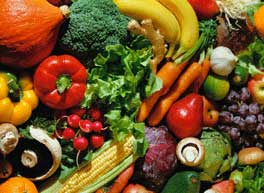Eating "clean" once meant nothing more than steamed broccoli and chicken in a Tupperware container. Putting an end to this myth can actually mean extra attention to eliminating additives, bulking agents, preservatives, pesticides and hormones. By doing just this, you really clean up your food, and your body will run much better. Similar to an automobile engine that uses only premium fuel, to decrease residue collection, we can streamline our energy source and decrease unwanted deposits in many parts of our bodies.
Not surprisingly, I occasionally hear from both camps that eating clean is dull and boring. They can't do it. However, eating "clean" has never been so "crisp and clean!"
Thinking back to my days in Food Science class, I was shocked to learn of scientists working so diligently to create tastes and smells that appeal to our senses, and would increase our "like" for the "food". We have all been duped, by teems of people who have robbed us of our ability to "eat just one". Many make a living by creating products that your taste buds just can't live without. And, the more of them that you eat, the more of them that you want! An inordinate amount of money is spent on researching what flavors we, the consumer, prefer, and how to produce them cost effectively. Why not simply combine some actual foods that already exist? Now, with the wisdom of years and such naïveté a thing of the past, I better understand our culture's heightened need for convenience foods, taste acclimation, and inexpensive grain-based fodder. How could we have been led astray?
For example, below is the ingredient list of a popular, some may say, addictive chip.
Whole Corn, Vegetable Oil (Contains One or More of the Following: Corn, Soybean and/or Sunflower Oil), Corn Maltodextrin, Salt, Tomato Powder, Corn Starch, Lactose, Whey, Nonfat Milk, Corn Syrup Solids, Onion Powder, Sugar, Garlic Powder, Monosodium Glutamate, Cheddar Cheese (Milk, Cheese Cultures, Salt, Enzymes), Dextrose, Malic Acid, Buttermilk, Natural and Artificial Flavors, Sodium Acetate, Artificial Color (Including Red 40, Blue 1, Yellow 5), Sodium Caseinate, Spice, Citric Acid, Disodium Inosinate, and Disodium Guanylate
Here is another chip that retails for $2.00-$3.00 more per bag.
Stone ground Corn, High Oleic Sunflower Oil and/or Safflower Oil, Sesame Seeds, Corn Bran, Sea Salt
We are now beginning to see a small response to the need for healthier convenience foods, but manufacturers are tagging a steep price for this demand. However, I still promote fresh, wholesome "clean" foods on a regular basis, and try to limit the processed items as much as possible. Nowadays, eating "clean" means a major reduction in manufactured foods, the great majority of which contain high fructose corn syrup (NEVER consume this), bulking agents, stabilizers, and preservatives. High fructose corn syrup has been shown to increase obesity through various and simultaneous mechanisms that make it a dangerous compound to consume due to the concentrated calories as a sweetener, the impact on leptin (a fat regulating hormone), its metabolic pathway that can increase triglycerides, and by its increased presence in most processed foods. Beware of the supermarket's aisles, and do your best to remain on the perimeter, or "Parquet", to help choose wholesome and fresh foods. Don't be afraid to cook in clean and crisp manner. Sautee and stir fry veggies in coconut oil with a dash of herb. Bake chicken and fish with crushed nut toppings, instead of breadcrumbs to increase protein and essential fatty acids. There are many simple ways to ensure that clean, vital nutrients enter your system in lieu of other fillers.
Do I really need to eat cleanly? Yes, of course! With so much sacrifice that goes into all of the training and racing that we do, this detail can be the true difference-maker. Performance above all else! Not at any cost! Above all else. The difference is significant. Injuries, sickness, fatigue, increased fat storage (yes, even athletes have this), slowed recovery, a lacking immune system, and oxidative stress all compromise performance. To minimize these, we must first "clean up" our nutritional intake. Many athletes still make the novice mistake of over consuming non-nutritive foods, boasting that it is okay, because they are in training. No matter the goal, sport-specific performance or weight loss, over consuming low nutrient foods is never a good idea. I have heard, and been involved in, more than enough discussions with athletes who assert that they do not eat ice cream, or partake in desserts, while those listening gasp in disbelief. "What?! An endurance athlete that doesn't indulge? That's the ONLY reason I exercise."
High volume training requires nutrients, not just calories. I always recommend that my athletes eliminate most grains and refined sugars, and that they include organic free range, pesticide-free wholesome foods. This is good sound advice for the general public, both athletes and non-athletes alike. A healthier and stronger you performs better, regardless of whether you are competing in a triathlon, making it through the workday, or keeping up with young children. If nothing else, eat "crisp and clean" for a better performance in every walk of life.















Comments